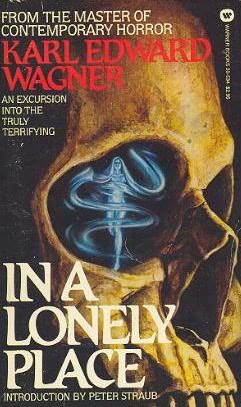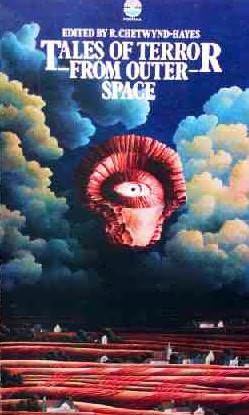
In a Lonely Place by Karl Edward Wagner
There are seven stories in this collection: In the Pines, Where the Summer Ends, Sticks, The Fourth Seal, .220 Swift, The River of Night’s Dreaming, and Beyond Any Measure. All seven of the stories are of the same general length, ranging from 30 to 50 pages. Most of them have been reprinted elsewhere, often in collections purporting to be the best of this type or that.
You can find most of the stories elsewhere. You probably shouldn’t.
Setting aside the lively introduction by Peter Straub, Wagner’s stories work exceptionally well together, because his style remains similar enough through the tales to provide a sense of continuity for the reader, but the specifics… plot, setting, characterization, structure… vary enough for each story to stand distinct in the mind of the reader.
The stories are set very much in the style of classical horror, with people being drawn inexorably toward a terrible fate. The circumstances of these characters is horrible in no small part due to their casual familiarity; we know these people, or at least people like them. Some of the characters are so familiar that we recognize many of our own traits in them. We want them to do well, even as we see the tragic flaws of personality or intellect that are likely to doom them.
It isn’t merely that Wagner produces a good story, however. He tried (and generally succeeded) making his tales stand out, whether from one of the oddest choices of threat chronicled in horror fiction (Where the Summer Ends) or from an oddly logical choice of world-bending conspiracy (The Fourth Seal) or merely a new take on a classic creature (Beyond Any Measure.)
This is a rare collection, one which seven equally knowledgeable and experienced people could read and walk away with a different favorite story. The craftsmanship is superb, the stories are engaging and the conclusions are satisfying.
Five stars out of five.

Tales of Terror From Outer Space ed. By R. Chetwynd Hayes
In his introduction, Hayes writes that in the process of selecting stories for this anthology, he had read roughly fifty science fiction anthologies, all of which had as their focus alien invaders and their interactions with Earth people.
It shows in his selections. The collection varies across time… the earliest story was from 1949, the most recent from 1975... And across borders; some stories come from the UK, some from the US, and one notable piece is translated from the original French, from France. The one consistency is the value of the stories. It starts with I, Mars by Ray Bradbury, which is a powerful and rarely reprinted story by the legendary author, suffering only from being truly clever. The pieces range dramatically in tone and format; the work of Brian Aldiss is bitingly dark and brilliant in its choice of narrator, while Robert Bloch contributes some of the dark humor for which he was known and Robert Sheckley produces an upbeat story which only produces a sense of disquiet upon the inevitable consideration of the tale’s meaning.
There are two points, and only two points, where I find fault with the anthology. The first of them is a structural one. When Chetwynd-Hayes mined “The Head-Hunters” from Stories For Tomorrow, he neglected to separate the original introduction in that anthology from the story he reprinted. The format switch is an uncharacteristic lapse of the typically professional editor. The second lapse is, unfortunately, Chetwynd-Hayes’ decision to use his own story, “Shipwreck”, to end the book. It is one of the weakest stories in the book, if not the least among them, and as such was a poor choice for a last impression with a reader. That’s not to say it is a bad story; it isn’t. The man was a gifted writer, and he produced a story which would have fit nicely into most of the fifty anthologies he referenced in his introduction. But his efforts had produced what was effectively a “best of the best”, and there were simply better choices among the contents for the ultimate story.
R. Chetwynd-Hayes deserves more attention in the United States, both as writer and editor. This is a fine place to start if you’re unfamiliar with his editorial work, and a pleasant addition if you have enjoyed his efforts in the past.
Four stars out of five.

Conjure Wife by Fritz Leiber
Sometimes it’s daunting to review a book. This usually happens when a book has been reviewed, analyzed, criticized and dissected by experts in the field.
I haven’t let it stop me yet; I’ve been trying to review at least one acknowledged classic every month. There is a reason why these books have received so much attention: they’re great.
Such is the case with Conjure Wife. It was recently re-released in trade paperback, but the first time it appeared in the pages of a book was as part of an omnibus, Witches Three, in 1953. For the past fifty years, people have been discovering the book and turning friends onto it. The title has gone out of print for short spans of time, only to be released by another publisher once the demand rises to a suitable level.
The basis of the story is simple: a professor who specializes in mythology and superstition discovers that his wife has been working tiny bits of spell-craft to help them in their daily lives. She is embarrassed to admit what she’s been doing, recognizing the superstition involved. At his insistence, she destroys all of the small charms and wards she has created over the years. Immediately, everything in their lives starts to go wrong.
You, as the reader, get to watch as the professor’s view of the world is forcibly changed by his experiences. Despite his protests and attempts at rationalization, he is made to deal with magic under the duress of being targeted by it.
The book is a thriller. It contains a thoughtful comparative analysis of magic from a scientific viewpoint. It is a charming character piece. It contains deft and beautiful prose. It provides an interesting new view of witches and spells. And Leiber manages to pull this oft deftly, within a novel which only spans half of the length of most contemporary novels.
I read this novel twenty-five years ago and it impressed me. I read it this month, and it reminded me of just how great Leiber could be.
Five stars out of five.
--Bill Lindblad
